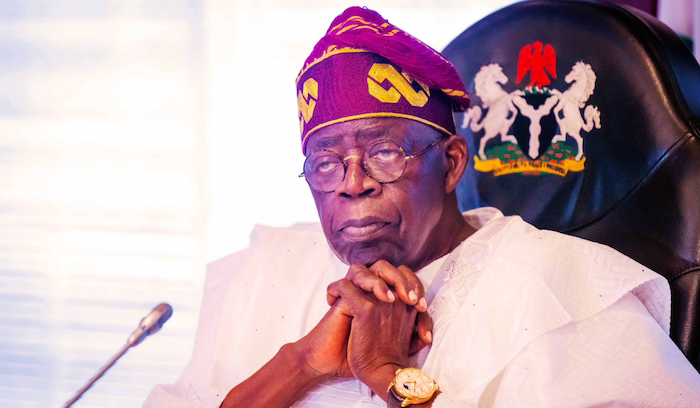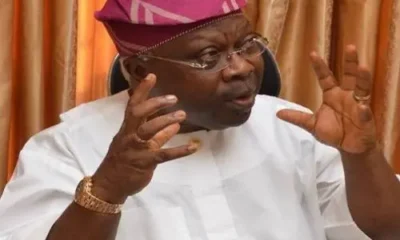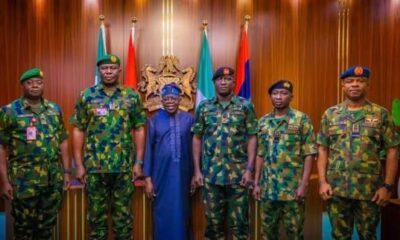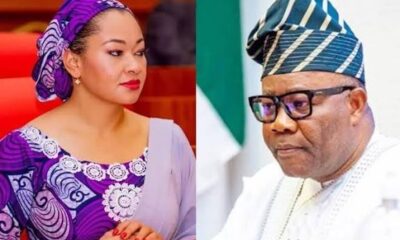Opinion
State pardon: When the President demarkets Nigeria

President Bola Tinubu’s decision to grant state pardon to 175 convicted persons to mark Nigeria’s 65th Independence anniversary has generated widespread disbelief and concern. While presidential clemency is a constitutional power meant to correct judicial excesses and show mercy in rare situations, the profile of those pardoned raises questions about the message the Nigerian government is sending to its citizens and the world.
According to StatiSense, of the 175 released, 29.2 per cent had been convicted for drug-related offences, 24 per cent for unlawful mining, 13.5 per cent for homicide, 12.3 per cent for fraud and corruption, 5.8 per cent for hijacking, and others for firearms, robbery, kidnapping, and human trafficking. These are not petty offenders or first-time lawbreakers. We are talking about individuals convicted of some of the most serious crimes in the land, including murder and kidnapping. These are offences that have devastated countless families and communities.
Even more disturbing is the inclusion of a woman who murdered her husband in cold blood, and a legislator who was entrusted with investigating a major national issue but instead used his position to solicit bribes and was caught on camera. These are not people who made innocent mistakes or were targeted by dictatorial regimes. They betrayed trust, destroyed lives and undermined national institutions. Yet, they have now walked free simply because they are highly connected individuals.
One wonders why the billionaire Kidnapper, Evans (Chukwudumeme Onwuamadike), or terror kingpin, Abubakar Shekau, were not on the list. Also, why were notorious armed robbers like Ishola Oyefusi, Shina Rambo, Godogodo (Abiodun Egunjobi), Lawrence Anini and Monday Osunbor missing on the list? After all, what’s sauce for the goose is sauce for the gander.
At a time when Nigeria is fighting to rebuild global credibility, attract foreign investment and combat the stereotype of being soft on corruption and crime, this decision sends the opposite message. It suggests that justice in Nigeria is negotiable, consequences are selective, and the rule of law can be suspended for the well-connected. It deepens the perception that Nigeria operates on a two-track system: one for the powerful and another for the powerless.
For years, international observers have raised concerns about weak institutions and inconsistent law enforcement. This mass pardon has only reinforced those doubts. When foreign governments and investors see a country where murderers, drug traffickers, corrupt politicians and kidnappers can be granted clemency so easily, they question whether Nigeria is truly serious about security, accountability, and reform. This has implications for diplomatic relations, foreign aid and global partnerships. No nation wants to cooperate closely with a country that appears to reward criminality.
The domestic impact is even more damaging. Law-abiding Nigerians, who are already frustrated with insecurity and corruption, are now being shown that crime can pay if one has the right connections. What incentive remains for citizens to follow the law when the state itself appears willing to look the other way?
Nigeria is already struggling with a culture of impunity. Politicians embezzle public funds without consequence, kidnappers negotiate ransoms openly, bandits with their arms pose for photographs with politicians, and security agencies are overwhelmed. Instead of strengthening the system and restoring faith in the justice system, this decision undermines the efforts of law enforcement officers, judges and prosecutors who worked tirelessly to bring these offenders to justice. Why should the police risk their lives arresting criminals if those criminals can be released with the stroke of a pen? Why should judges uphold the law if their verdicts can be nullified on political grounds? Decisions like this weaken the very foundations of governance.
Supporters of the pardon may argue that clemency is a tool of compassion. In certain cases, that is true. Presidential pardons have historically been used around the world to correct wrongful convictions, release the terminally ill, or offer a second chance to low-risk offenders who have shown that they are on the path to rehabilitation. Controversial cases or those alleged to be politically motivated, like the cases of Herbert Macaulay, Mamman Vatsa and Ken Saro-Wiwa, could fall under this category.
But this list goes far beyond mercy. Many of these crimes were violent, exploitative, or deeply corrosive to public trust. The pardon was broad and poorly explained. Who recommended these individuals? What criteria were used? Where is the transparency? Without proper justification, the public is left to assume that politics rather than principle or national interest guided the decision.
The timing also matters. Nigeria faces unprecedented challenges. There is rising insecurity, economic hardship, unemployment and dwindling faith in the government. Citizens are asked to be patient and sacrifice for the nation, yet they watch as the elite receive special treatment. This fuels resentment and widens the gap between the leaders and followers. A nation cannot build unity on injustice. Releasing convicted criminals, especially high-profile, controversial ones, without accountability only deepens the belief that Nigeria is a place where connections matter more than character.
There are also long-term consequences. When the justice system is seen as unpredictable or partial, citizens may begin to seek justice on their own. This leads to mob action, vigilantism, and further breakdown of law and order. Also, the youth (who are already disillusioned) may begin to believe that integrity is pointless. How do we preach discipline in schools when the country rewards indiscipline at the top? How do we convince young Nigerians to shun crime when the system appears to protect criminals more than their victims?
Nigeria urgently needs a credible justice system, specifically one that punishes wrongdoing fairly and consistently. The reason people avoid breaking the law in developed countries is that they know that the justice system does not care about their status or who they know. Instead of freeing offenders, the government should have used this moment to demonstrate seriousness about reform, security and accountability. There were better options: reviewing cases of wrongful conviction, pardoning low-risk offenders who have already served long sentences, prioritising rehabilitation, focusing on restorative justice, etc. But freeing murderers, corrupt officials and kidnappers was neither wise nor defensible.
Leadership is not just about legal powers; it is about moral judgment. The President has the constitutional right to grant pardons, but legality does not necessarily mean legitimacy. The question is not whether he could do it, but whether he should have done it. While mercy without justice is dangerous, justice without transparency is hollow. A government that protects criminals loses the moral authority to govern.
If Nigeria is to be respected at home and abroad, it must uphold the rule of law rather than undermine it. It must show the world as well as its own citizens that crime has consequences, leadership carries responsibility, and no one is above accountability. The future of this country depends on rebuilding trust. However, trust cannot survive when convicted offenders walk free while ordinary people continue to suffer in an environment of insecurity and injustice.
It is unfortunate that while Nigerian youths are using their artistic and professional skills to polish the image of the country, politicians are daily taking actions that smear their efforts. After decades of tagging Nigeria a corrupt country known for drug-trafficking, Nigerian music has created a positive image for Nigeria, which has made the world pay attention and see that there are many positives about Nigerians. But the actions of the Nigerian leadership class have continued to taint all those efforts.
Nigeria deserves better. Victims deserve better. The world expects better. At this critical moment, the government must remember: the strength of a nation is not in the power of its leaders, but in the integrity of its justice.
•Written By Azuka Onwuka
X: @BrandAzuka
-

 African News24 hours ago
African News24 hours ago11 gunned down as mass shooting rocks South Africa
-

 Politics8 hours ago
Politics8 hours agoOsun gov’ship: My disqualification a huge joke – Omisore
-

 Opinion8 hours ago
Opinion8 hours agoInsecurity and plenty conspiracy theories
-

 Business22 hours ago
Business22 hours agoBREAKING: Dantata & Sawoe ‘pays’ consultant $1.4 million Dangote project debt in bid to escape liquidation
-

 Business8 hours ago
Business8 hours agoCAC To Ban Unregistered PoS Operators From Jan 1
-

 News8 hours ago
News8 hours agoBrazilian Ship Intercepted with 25.5kg Cocaine at Lagos Port
-

 Politics7 hours ago
Politics7 hours agoHow APC, ADC Benefit From PDP Crisis
-

 News7 hours ago
News7 hours agoAkpabio Denies Filing Fresh N200bn Suit Against Sen Natasha


















